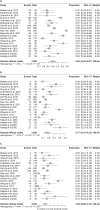Causes for Retraction in the Biomedical Literature: A Systematic Review of Studies of Retraction Notices
- PMID: 37873630
- PMCID: PMC10593599
- DOI: 10.3346/jkms.2023.38.e333
Causes for Retraction in the Biomedical Literature: A Systematic Review of Studies of Retraction Notices
Abstract
Background: Many studies have evaluated the prevalence of different reasons for retraction in samples of retraction notices. We aimed to perform a systematic review of such empirical studies of retraction causes.
Methods: The PubMed/MEDLINE database and the Embase database were searched in June 2023. Eligible studies were those containing sufficient data on the reasons for retraction across samples of examined retracted notices.
Results: A 11,181 potentially eligible items were identified, and 43 studies of retractions were included in this systematic review. Studies limited to retraction notices of a specific subspecialty or country, journal/publication type are emerging since 2015. We noticed that the reasons for retraction are becoming more specific and more diverse. In a meta-analysis of 17 studies focused on different subspecialties, misconduct was responsible for 60% (95% confidence interval [CI], 53-67%) of all retractions while error and publication issues contributed to 17% (95% CI, 12-22%) and 9% (95% CI, 6-13%), respectively. The end year of the retraction period in all included studies and the proportion of misconduct presented a weak positive association (coefficient = 1.3% per year, P = 0.002).
Conclusion: Misconduct seems to be the most frequently recorded reason for retraction across empirical analyses of retraction notices, but other reasons are not negligible. Greater specificity of causes and standardization is needed in retraction notices.
Keywords: Misconduct; Retraction; Retraction of Publication; Withdrawal.
© 2023 The Korean Academy of Medical Sciences.
Conflict of interest statement
All authors have completed the ICMJE uniform disclosure form at www.icmje.org/disclosure-of-interest/ and declare Marco Solmi received honoraria/has been a consultant for Angelini, Lundbeck, Otsuka.
Figures



References
-
- Vuong QH, La VP, Hồ MT, Vuong TT, Ho MT. Characteristics of retracted articles based on retraction data from online sources through February 2019. Sci Ed. 2020;7(1):34–44.
-
- Fanelli D, Ioannidis JP, Goodman S. Improving the integrity of published science: an expanded taxonomy of retractions and corrections. Eur J Clin Invest. 2018;48(4):e12898 - PubMed
-
- Yeo-Teh NSL, Tang BL. An alarming retraction rate for scientific publications on coronavirus disease 2019 (COVID-19) Account Res. 2021;28(1):47–53. - PubMed
Publication types
MeSH terms
LinkOut - more resources
Full Text Sources

